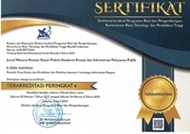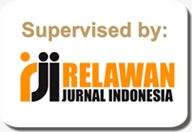Reformasi Administrasi di Korea Selatan: Sebuah Pembelajaran Kesuksesan
Abstract
This research examined the strategy and process of administrative reform in South Korea. The method was using a descriptive qualitative approach with analysis of literature study from secondary data. The results showed that there were six strategies in South Korea administrative reform, i.e.: (1) downsizing; (2) deregulations; (3) reorganization; (4) administrative efficacy; (5) debureaucratization; and (6) decentralization. Downsizing was applied to shrink government institutions in every regime. Deregulations was applied through business privatization and economic liberalization to escape from economic crisis. Reorganization was applied by merging several government institutions to improve the communication process and public service. Administrative efficacy was applied through utilizing and improving e-government in public service. Debureaucratization was applied toward civil servants to promote professional and competent bureaucrats. Decentralization was applied to shorten the decision making process and create contextual local-government policy.
Keywords
Full Text:
PDFReferences
Bae, Y. (2016). Ideas, Interests and Practical Authority in Reform Politics: Decentralization Reform in South Korea in The 2000s. Asian Journal of Political Science, 24(1), 63–86.
Brandsen, T., & Kim, S. (2010). Contextualing the Meaning of Public Management Reforms: a Comparison of The Netherlands and South Korea. International Review of Administrative Science, 76(2), 367–387.
Caiden, G. E. (1991). Administrative Reform. In A. Farazmand (Ed.), Handbook of Comparative and Development Public Administration. New York: Marcel Dekker, Inc.
Choi, H. (2010). E-Government in South Korea. In E. M. Berman, M. J. Moon, & H. Choi (Eds.), Public Administration in East Asia: Mainland China, Japan, South Korea, and Taiwan. Boca Rotan, Florida: Taylor and Francis.
Choi, J., & Choi, T. (2017). Changes in The Political, Social and Economic Environment of Public Policy in South Korea After 1980s. In J. Choi, H. J. Kwon, & M. G. Koo (Eds.), The Korean Government and Public Policies in a Development Nexus Sustaining Development and Tackling Policy Changes. Singapore: Springer International Publishing.
Cresswell, J. W. (2017). Research Design: Pendekatan Kualitatif, Kuantitatif, dan Mixed. (Edisi Keem). Yogyakarta: Pustaka Pelajar.
Faguet, J. P. (2014). Decentralization and Governance. World Development, 53(1), 2–13.
Fesler, J. W., & Kettl, D. F. (1996). The Politics of The Administrative Process (Second Edi). New Jersey: Chatham House Publishers Inc.
Guo, B. (2017). China’s Administrative Governance Reform in The Era of “New Normal. Journal of Chinese of Political Science, 22, 357–373.
Hammerschmid, G., Walle, S. Van De, Andrews, R., & Mostafa, A. M. . (2018). New Public Management Reforms in Europe and Their Effects: Findings from a 20-Country Top Executive Survey. International Review of Administrative Sciences, 0(0), 1–20.
Hamzah, A. (2019). Metode Penelitian Kepustakaan: Kajian Filosofis, Teoritis, dan Aplikatif. Malang: Literasi Nusantara Abadi.
Hardjosukarto, S. (1994). Pelayanan Prima. Jurnal Bisnis Dan Birokrasi, 4(3).
Heo, I. (2018). The Paradox of Administrative Decentralization Reform in Young Asian Democracies South Korea and Indonesia. World Affair, 181(4), 372–402.
Hidayat, L. M. (2007). Reformasi Administrasi Kajian Komparatif Pemerintahan Tiga Presiden. Jakarta: Gramedia Pustaka Utama.
Hwang, K. S. (2018). Understanding Complexity Administrative Reform. International Journal of Organization Analysis, 27(3), 630–643.
Im, T., Prombescu, G., & Lee, H. (2013). ICT as a Buffer to Change: A Case Study of the Seoul Metropolitan Government’s Dasan Call Center. Public Performabce and Management Review, 36(3), 436–455.
Im, Tobin. (2014). Bureaucratic Power and Government. In H. J. Kwon & M. G. Koo (Eds.), The Korean Government and Public Policies in a Developments Nexus. Singapore: Springer International Publishing.
Im, Tobin. (2017). Introduction: Bureaucracy and Korean Development. In Tobin Im (Ed.), The Experience of Democracy and Bureaucracy in South Korea. Bingley UK: Emerald Publishing Limited.
Im, Tobin, & Lee, S. J. (2012). Does Management Performance Impact Citizen Satisfaction. American Review of Public Administration, 42(4), 419–436.
Kasim, A. (1998). Reformasi Administrasi Negara sebagai Prasyarat Upaya Peningkatan Daya Saing Nasional. Jakarta: FISIP-Universitas Indonesia.
Kim, B. J., & So, S. C. (2004). An Assessment of Seoul Metropolitan Government Reform Strategies. International Review of Public Administration, 8(2), 77–89.
Kim, P. S. (2010). The Civil Service System in The Republic of Korea. In E. M. Berman, M. J. Moon, & H. Choi (Eds.), Public Administration in East Asia: Mainland China, Japan, South Korea, and Taiwan. Boca Rotan, Florida: Taylor and Francis.
Kim, S., & Han, C. (2015). Administrative Reform in South Korea: New Public Management and The Bureaucracy. International Review of Administratives Sciences, 81(4), 694–712.
Koo, J., & Kim, B. J. (2018). Two Faces of Decentralization in South Korea. Asian Education and Development Studies, 7(3), 291–302.
Koo, M. G. (2014). Trade Policy for Development: Paradigm Shift from Mercantilism to Liberalism. In H. J. Kwon & M. G. Koo (Eds.), The Korean Government and Public Policies in a Developments Nexus. Singapore: Springer International Publishing.
Kwon, H. J. (2014). Governing the Developmental Welfare State: from Regulation to Provision. In H. J. Kwon & M. G. Koo (Eds.), The Korean Government and Public Policies in a Developments Nexus. Singapore: Springer International Publishing.
Kwon, H. J. (2017). Leaving Behind the Devoplemental State: The Changing Rationale of Governance in Korean Government. In J. Choi, H. J. Kwon, & M. G. Koo (Eds.), The Korean Government and Public Policies in a Development Nexus Sustaining Development and Tackling Policy Changes. Singapore: Springer International Publishing.
Lee, C. K., & Moon, M. J. (2010). Performance Management Reforms in South Korea. In E. M. Berman, M. J. Moon, & H. Choi (Eds.), Public Administration in East Asia: Mainland China, Japan, South Korea, and Taiwan. Boca Rotan, Florida: Taylor and Francis.
Lee, C. W. (2004). A Critical Review on The Administrative Reform in The Korean Central Government: A Case Study of Kim Dae Jung Administration. International Review of Public Administration, 9(1), 113–120.
Lodge, M., & Gill, D. (2011). Toward a New Era Administrative Reform? The Myth of Post-NPM in New Zealand. Governance, 24(1), 141–166.
Maksum, I. R. (2014). Strategi Reformasi dalam Pemerintahan Republik Indonesia. Jurnal Ilmu Pemerintahan, 45, 59–69.
Moon, M. J., & Kim, P. S. (2006). The Prospects and Limitations of Civil Service Reform in Korea: Strong Initiation, but Uncertain Sustainability. International Journal of Organization Theory and Behavior, 9(2), 235–253.
O’Donnell, M., & Turner, M. (2013). Leading The World: Public Sector Reform and E-Government in Korea. The Economic and Labour Relations in Review, 48(9), 1059–1084.
OECD Skills Outlook 2013: First Result from The Survey of Adult Skills. (2013).
Park, J. (2018). Korea’s Government Reform in Public Policy and Management. Asian Education and Development Studies., 7(3), 256–265.
Park, S. H., & Wilding, M. (2016). The Politics of Government Reform in Korea: from Tripartie to Bipartie Politicization. Administration & Society, 48(9), 1059–1084.
Prasojo, E. (2009). Reformasi Kedua Melanjutkan Estafet Reformasi Administrasi. Jakarta: Salemba Humanika.
Prasojo, E., Maksum, I. R., Kartika, E., & Kurniawan, T. (2007). Deregulasi dan Debirokratisasi Perizinan di Indonesia. Jakarta: Departemen Ilmu Administrasi FISIP UI.
Prombescu, G. A. (2016). Comparing The Effects of E-Government and Social Media Use Trust in Government Evidence from Seoul, South Korea. Public Management Review, 18(9), 1308–1334.
Rho, S. Y., & Lee, S. J. (2010). History and Context Public Administration In Korea. In E. M. Berman, M. J. Moon, & H. Choi (Eds.), Public Administration in East Asia: Mainland China, Japan, South Korea, and Taiwan. Boca Rotan, Florida: Taylor and Francis.
Satori, D., & Komariah, A. (2011). Metodologi Penelitian Kualitatif. Bandung: CV Alfa Beta.
Tjiptoherijanto, P., & Manurung, M. (2017). Paradigma Administrasi Publik dan Perkembangannya. Jakarta: Rineke Cipta.
Xue, L., & Liou, K. T. (2012). Government Reform in China: Concepts and Reform Cases. Review of Public Personnel Administration, 32(2), 115–133.
Yang, S. B., & Torneo, A. R. (2016). Government Performance Management and Evaluation in South Korea. History and Current Practices. Public Performance & Management Review, 39(2), 279–296.
DOI: http://dx.doi.org/10.31845/jwk.v23i2.667
Refbacks
- There are currently no refbacks.
Copyright (c) 2020 Ramadhani Haryo Seno

This work is licensed under a Creative Commons Attribution-NonCommercial-ShareAlike 4.0 International License.
JURNAL WACANA KINERJA INDEXED BY:
__________________________________________________________________________________________________________
@2023 Center fo State Civil Apparatus Training and Development and Competency Mapping (Pusat Pelatihan dan Pengembangan dan Pemetaan Kompetensi Aparatur Sipil Negara Lembaga Administrasi Negara - Puslatbang PKASN LAN) Jl. Kiara Payung KM. 4, 7 Jatinangor, Sumedang, Jawa Barat 45366 Telp. (022) 7790048-7790044-7790049-7782041-7782042 Fax. (022) 7790055-7782178; Email: wacanakinerja@yahoo.com; wacanakinerja@gmail.com
Powered by OJS
















